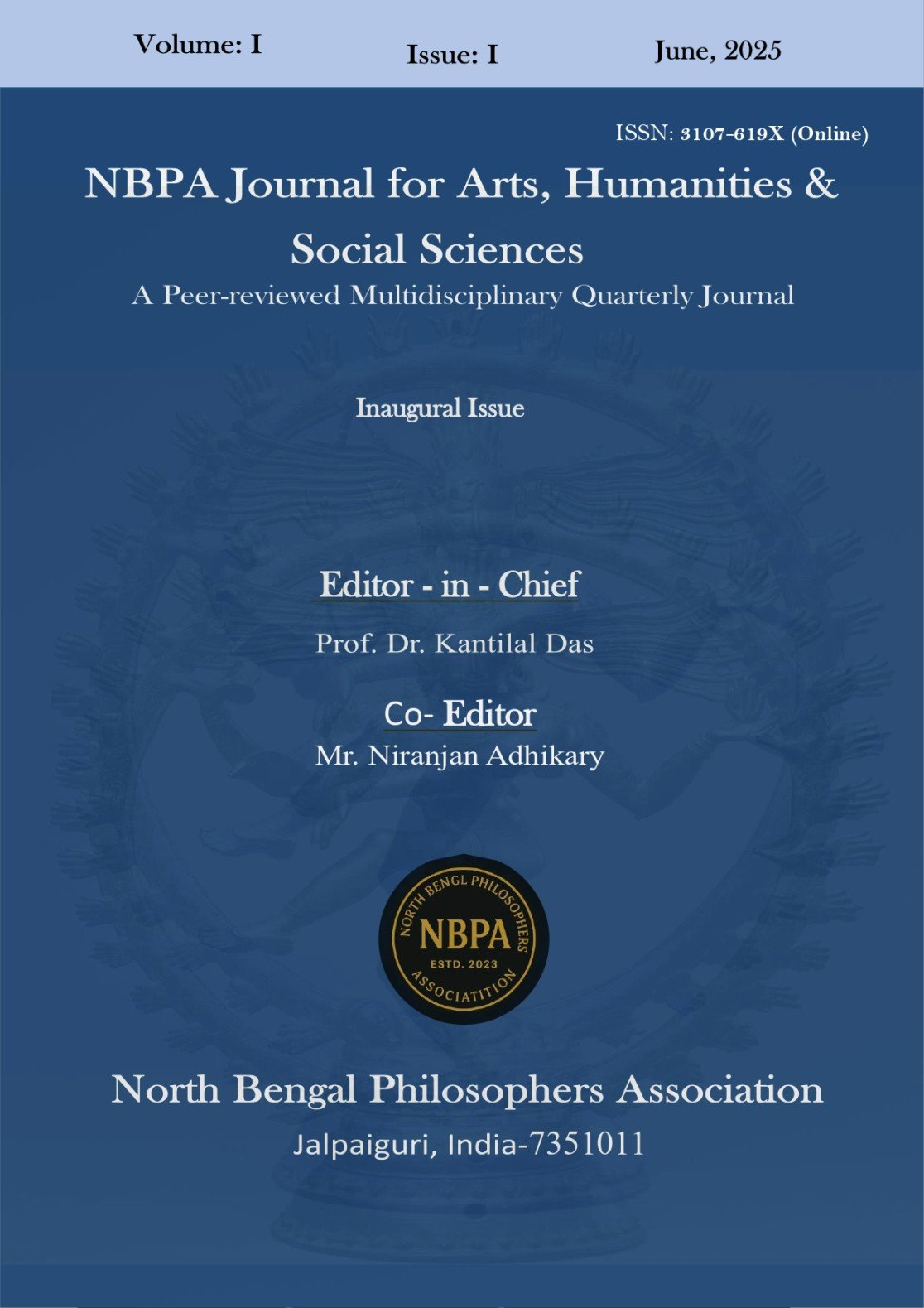Is Use Enough? The Problem of Normativity in Wittgenstein’s Theory of Meaning
DOI:
https://doi.org/10.65842/nbpa.v1.i1.004Keywords:
Wittgenstein, meaning as use, normativity, rule-following, language gameAbstract
In his later work, particularly in the Philosophical Investigations, Wittgenstein emphasizes that grasping meaning demands accepting the varied frameworks and practices within which language functions. This method highlights the everyday use of language over theoretical definitions, underlining the consequence of social interactions and experiences in constructing meaning. Here, it will be made to explain a full study of the normativity issues associated with Ludwig Wittgenstein's use theory of meaning, as seen in Philosophical Investigations (1953). Wittgenstein's denial of the referential theory of meaning augments investigations into the capability of public practices in speaking linguistic truth and engages with continuing anxieties in the philosophy of language. The paper: (1) reconstructs Wittgenstein's criticisms of ostensive definition and private language; (2) investigates Saul Kripke's (1982) skeptical challenge on rule-following; (3) evaluates John McDowell's (1984) "second nature" response and Baker & Hacker's (1985) conventionalist interpretation; and (4) argues that Wittgenstein's emphasis on training (§§143–155) and custom (§198) provides a non-reductive explanation of normativity. Building on the recent works of Meredith Williams (1999) and Charles Travis (2008), the paper claims that by understanding normativity as resulting from socially embodied know-how rather than from clear laws, Wittgenstein's model avoids circularity.
References
Augustine. (1997). Confessions (F. J. Sheed, Trans.). UK: Hackett.
Locke, J. (1975). An Essay Concerning Human Understanding. UK: Oxford University Press.
Wittgenstein, L. (1922). Tractatus logico-philosophicus (C. K. Ogden, Trans.). Routledge. (Original work published 1921)
Wittgenstein, L. (1953). Philosophical Investigations (G. E. M. Anscombe, Trans.). UK: Blackwell.
Baker, G. P., & Hacker, P. M. S. (1980). Wittgenstein: Understanding and meaning. Volume 1. UK: Blackwell.
Baker, G. P., & Hacker, P. M. S. (1985). Wittgenstein: Rules, grammar and necessity. Volume 2. UK: Blackwell.
Brandom, R. B. (1994). Making it explicit: Reasoning, representing, and discursive commitment. USA: Harvard University Press.
Glock, H.-J. (1996). A Wittgenstein dictionary. UK: Blackwell.
Kripke, S. A. (1982). Wittgenstein on rules and private language. USA: Harvard University Press.
Malcolm, N. (1986). Nothing is hidden: Wittgenstein's criticism of his early thought. UK: Blackwell.
McGinn, M. (1997). Wittgenstein and the Philosophical Investigations. UK: Routledge.
McDowell, J. (1994). Mind and world. USA: Harvard University Press.
Stern, D. G. (2004). Wittgenstein's Philosophical Investigations: An introduction. UK: Cambridge University Press.
Tomasello, M. (2003). Constructing a language: A usage-based theory of language acquisition. USA: Harvard University Press.
Varela, F. J., Thompson, E., & Rosch, E. (1991). The embodied mind: Cognitive science and human experience. USA: MIT Press.
Williams, M. (1999). Wittgenstein, mind and meaning: Toward a social conception of mind. UK: Routledge.
Boghossian, P. (1989). The rule-following considerations. Mind, 98(392), 507–549.
Everett, D. L. (2005). Cultural constraints on grammar and cognition in Pirahã. Current Anthropology, 46(4), 621–646.
McDowell, J. (1984). Wittgenstein on following a rule. Synthese, 58(3), 325–363.
Perry, J. (1979). The problem of the essential indexical. Noûs, 13(1), 3–21.
Roberson, D., Davies, I., & Davidoff, J. (2000). Color categories are not universal: Replications and new evidence from a stone-age culture. Journal of Experimental Psychology: General, 129(3), 369–398.
Saffran, J. R., Aslin, R. N., & Newport, E. L. (1996). Statistical learning by 8-month-old infants. Science, 274(5294), 1926–1928.
Winawer, J., Witthoft, N., Frank, M. C., Wu, L., Wade, A. R., & Boroditsky, L. (2007). Russian blues reveal effects of language on color discrimination. Proceedings of the National Academy of Sciences, 104(19), 7780–7785.
Travis, C. (2008). Psychologism. In Occasion-sensitivity: Selected essays (pp. 15–52). UK: Oxford University Press.
Bender, E. M., & Koller, A. (2020). Climbing towards NLU: On meaning, form, and understanding in the age of data. Proceedings of the 58th Annual Meeting of the Association for Computational Linguistics (pp. 5185–5198).

Downloads
Published
Issue
Section
License
Copyright (c) 2025 Dr. Srobon K. Mondol (Author)

This work is licensed under a Creative Commons Attribution-NonCommercial-NoDerivatives 4.0 International License.



